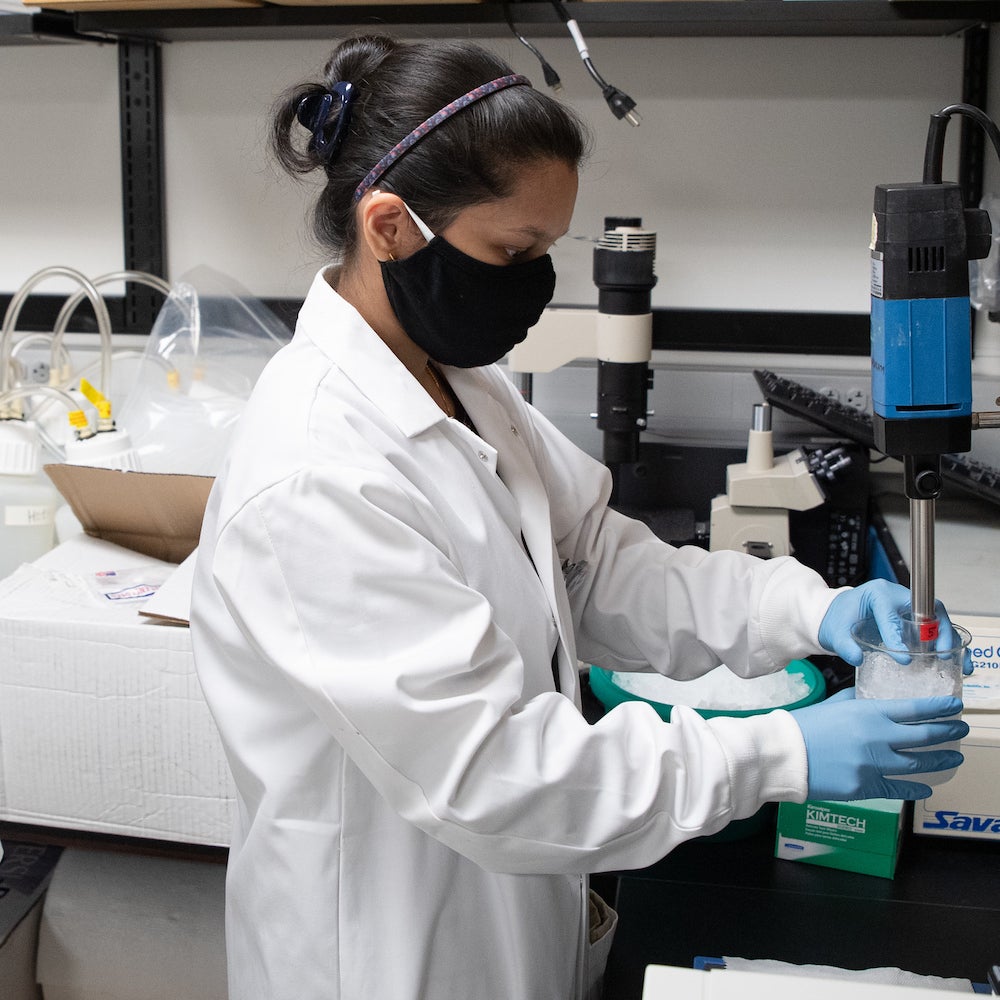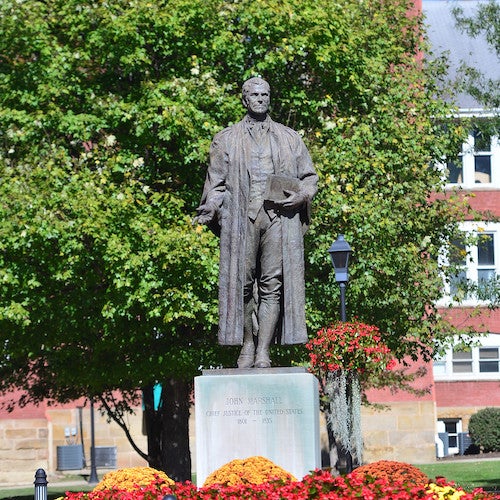Marshall University’s Interdisciplinary Clusters of Excellence cut across colleges and academic units to promote collaboration on university priorities.
Addiction & Opioid Recovery
The gradual progression of increased use of opioids, alcohol and other substances culminated in a perfect storm. Overprescribing practices, prescription misuse and illegal drugs hit Huntington, West Virginia and central Appalachia as a whole particularly hard.
The The Center of Excellence for Recovery aims to increase the well-being of West Virginians through behavioral health education, prevention, outreach, recovery, and applied research initiatives.
Website: Center for Excellence in Recovery
Recovery doesn’t happen alone. In Huntington, health care providers, hospitals, Marshall University, community organizations and grantors all work together to ensure that everyone has access to the addiction care and treatment they need. Marshall University, its Joan C. Edwards School of Medicine and Marshall Health are at the center of this change and hope our efforts lead to long-term recovery for individuals within Huntington and throughout southern West Virginia can help establish a model for other communities struggling with similar diseases of despair.
Website: Marshall Health Addiction Medicine
Advanced Manufacturing & Economic Development
The Marshall Advanced Manufacturing Center (formerly RCBI) encourages job creation, economic development, innovation and entrepreneurship by supporting manufacturing companies of all sizes. We offer leading-edge equipment use and specialized training for everyone from sole proprietors to Fortune 500 companies.
Simply put, our goal is to use our Advanced Manufacturing Technology Centers across West Virginia to provide the resources that individuals and companies need to create, sustain, and expand their businesses. In addition to providing leased use of high-tech equipment, workforce development programs, Quality Management Implementation, and customized workforce training, the center assists companies in electronic networking and procurement – particularly with federal contracts.
The technologies available at the Advanced Manufacturing Center are among the best in the world, providing companies across the Mid-Atlantic region services that would not otherwise be readily available to them. In particular, we offer Additive Manufacturing (AM) technology with 3D Printers through its Design Works labs and is a national Center of Excellence for composite materials providing support to NASA engineers as well as first-tier Department of Defense suppliers in West Virginia. These activities help ensure that the center fulfills its mission of developing a quality, just-in-time supplier base for the Department of Defense as well as other agencies and the commercial sector.
We offer solutions to industry and individuals and serve more than 300 companies and train 800-plus individuals per year…with plans to continue to scale to help manufacturers grow.
Website: Marshall Advanced Manufacturing Center
Advanced Energy & Sustainability
Marshall has received funding to develop and staff a the Battery Research Institute at a new facility in South
Charleston, WV. A key focus is the electric aviation industry and the need for batteries that are powerful, resilient, and efficiently developed.
The focus of the Marshall University Sustainability Department is to identify guidelines that promote the most efficient use of the University’s resources, as well as coordinate and educate on sustainability issues, both on campus and beyond. The department emphasizes the tremendous opportunities for energy efficiency, waste reduction and recycling, a thriving local economy, an active, healthy community, and sustainable innovation.
Website: Sustainability Department
Aging & Gerontology
The Marshall University Center for Healthier Aging Initiatives in Appalachia is prepared to pioneer a new strategy for improving the health of older citizens in West Virginia and other rural and low-resource regions. The Center’s mission is to improve the quality of life for Appalachian seniors by developing clinical best practices, training today’s and tomorrow’s workforce in geriatric practice, establishing elder-related outreach programs, providing patient and provider education, and conducting cutting-edge research.
Website: Marshall Center for Healthy Aging in Appalachia
The Marshall Health Center for Aging, a provider-based department of Cabell Huntington Hospital, provides primary care for senior adults and 24/7 access to clinical advice.
Website: Marshall Health Center for Healthy Aging
Aviation & Advanced Air Mobility
Marshall’s Division of Aviation includes the Bill Noe Flight School, an FAA part 141 program, and an Aviation Maintenance Technology program, an FAA part 147 program offered in conjunction with Mountwest Community and Technical College.
Website: Division of Aviation
Cyber Security
Marshall University’s Institute for Cyber Security (ICS) is dedicated to advancing the field of cybersecurity through multidisciplinary research, education, training, and outreach programs. Our Institute brings together scholars and experts from various disciplines to tackle complex cybersecurity challenges from multiple perspectives.
Our programs and initiatives are designed to support the growth and development of the cybersecurity community. Our research projects explore the latest trends and technologies in cybersecurity, our educational programs provide students with hands-on training and real-world experience, and our outreach initiatives engage with industry partners and other stakeholders to address emerging cybersecurity needs.
Website: Institute for Cyber Security
Entrepreneurship, Design Thinking, Digital Humanities & Digital Media
The Brad D. Smith Student Incubator is designed for budding entrepreneurs who are seeking to launch their start-ups off the ground. The program was established in 2019 through a partnership between the Brad D. Smith Schools of Business and the Marshall University Advanced Manufacturing Center, and named for Marshall alum, benefactor and now university President, Brad D. Smith, whose successful career as a Silicon Valley executive inspired a passion for uplifting his home state of West Virginia. Students accepted into the incubator program receive best practices in entrepreneurship, mentorship from experienced StartUp mentors, and guidance and support as they test, adapt, and validate their business ideas in the market.
Website: Brad D. Smith Business Incubator
The Business Incubator is housed in the iCenter. Founded in 2018, the iCenter has trained more than 2700 students, faculty, staff and community members in Design Thinking. The iCenter also houses the Marshall University Innovation Catalyst Program providing professional development program for Marshall faculty, staff, administrators, and student leaders that trains them on how to apply design thinking to rapidly develop delightful solutions for pressing unsolved challenges that Marshall students face inside and outside of the classroom.
Website: iCenter
Digital Humanities allows us to explore and deepen the relationship between humanities disciplines and digital tools and technologies. Students develop their technical and critical thinking skills by using, creating, and reflecting on humanities data projects. DH students receive a multidisciplinary education from award-winning and grant-funded faculty from colleges throughout the university. Thus, students join a new generation of professionals who are both humanistically and digitally savvy.
Website: Digital Humanities at Marshall University
Forensic Science
Our forensic DNA testing laboratory is the core of the Marshall University Forensic Science Center’s mission to provide critical assistance to criminal justice agencies. Nationally recognized and accredited, MUFSC’s forensic laboratory provides essential testing services to state and local criminal justice systems throughout the United States. MUFSC’s services include: DNA analysis for property crime, sexual assault, and other forensic evidence; DNA analysis for relationship samples; DNA analysis for convicted offender samples for the state of West Virginia; and STR case review.
Website: Forensic Science DNA Lab
Marshall University’s Master’s Degree in Forensic Science is one of twenty-one FEPAC accredited graduate programs in the United States. Ranked #1 for twelve out of the last fourteen years on the FSAT Exam, the program
Website: Forensic Science Graduate Program
Obesity
In our modern era, the incidence of obesity has reached epidemic proportions, where over 30% of American adults and 17% of children and teens are obese. In 2017, WV ranked highest for obesity in the U.S. Many obese individuals suffer from related diseases, such as type 2 diabetes, hypertension, and dyslipidemia, leading to a decreased life span. This association of obesity with related metabolic diseases makes obesity a priority public health issue.
Website: Obesity and Related Diseases Cluster
Rural & Behavioral Health
The Robert C. Byrd Center for Rural Health focuses on training the next generation of rural physicians and inspiring health care advocates in Appalachian rural communities. We can all play a role in improving health disparities for at-risk populations.
Website: Robert C. Byrd Center for Rural Health
The Behavioral Health Center works closely with the Marshall community in planning systematic, psycho-educational programing that emphasizes a multicultural and developmental perspective on prevention, wellness and student self-help. The BHC values a community that provides a safe and optimal learning environment for all students. The BHC is also focused on providing leadership in areas of diversity that include the LGBTQ populations, international student populations, first-generation college students and cultural/ethnic minority student populations.
Website: Behavioral Health Center
The West Virginia Autism Training Center (WV ATC) was established in 1984 by the WV Legislature and housed at Marshall University. Services are available to families of West Virginians with autism spectrum disorder as well as their educators and others significant in their lives.
Website: WV Autism Training Center






